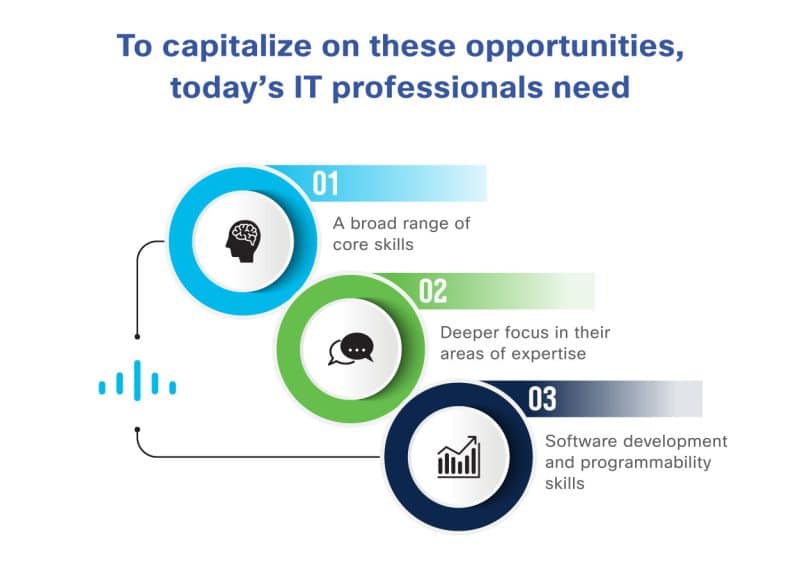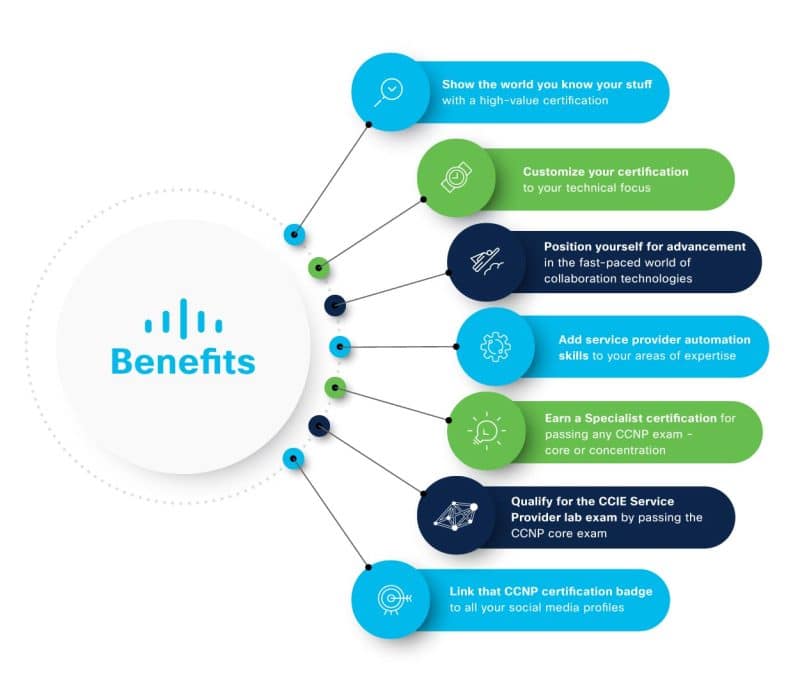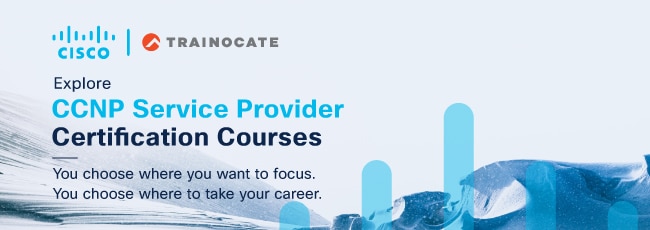Introducing the Cisco CCNP Service Provider certification program
Introducing the Cisco CCNP Service Provider certification program
New ways to scale and secure Cisco Service Provider infrastructure.
The relationship between software and networking will only continue to strengthen and becoming intertwined with the ever evolving technological landscape and rampant digitalization.
The leaps and bounds that technology is taking are enabling and empowering businesses and applications that connect everything, be it, people, devices, machines and/or applications. Along with intent-based networking, service providers can take advantage of automation to scale and secure their infrastructure. To capitalize on these opportunities, today’s service provider professionals need a broader range of skills and deeper focus in strategic technology areas. The Cisco CCNP Service Provider certification program gives you exactly that breadth and depth.
Gaining the CCNP Service Provider certification provides validations on your skills with utilizing service provider solutions. To earn CCNP Service Provider certification, you pass two exams: one that covers core service provider technologies and one service provider concentration exam of your choice, so you can customize your certification to your technical area of focus.

The CCNP Service Provider certification was designed specifically to help you prove your skills in the ever-changing landscape of service provider technologies. The certification covers core technologies and a service provider focus area of your choice. You choose where you want to focus. You choose where to take your career. Among the industry’s most widely recognized and respected certifications, Cisco CCNP certifications sets you apart. It tells the world you know what you are doing. In addition, completing any CCNP certification exam earns you a Cisco Specialist certification, so you get recognized for your accomplishments along the way.
Get Certified!
Exams and recommended training
To earn CCNP Service Provider, you pass two exams: a core exam and a service provider concentration exam of your choice. And now every exam in the CCNP Service Provider program earns an individual Specialist certification, so you get recognized for your accomplishments along the way.
- The core exam focuses on your knowledge of service provider infrastructure. The core exam is also the qualifying exam for CCIE Service Provider certification. Passing the core exam will qualify candidates to schedule and take the CCIE lab within the validity of their core exam.
- Concentration exams focus on emerging and industry-specific topics such as advanced routing, VPN services, and automation. You can prepare for concentration exams by taking their corresponding Cisco training courses.
Core exam:
| Required exam | Recommended training |
|---|---|
| 350-501 SPCOR | Implementing and Operating Cisco Service Provider Network Core Technologies (SPCOR) |
This exam tests your knowledge of implementing core service provider network technologies, including:
|
The Implementing and Operating Cisco Service Provider Network Core Technologies (SPCOR) v1.0 course teaches you how to configure, verify, troubleshoot, and optimize next-generation, Service Provider IP network infrastructures. It provides a deep dive into Service Provider technologies including core architecture, services, networking, automation, quality of services, security, and network assurance.
|
Concentration exams (choose one):
| Required exam | Recommended training |
|---|---|
| 300-510 SPRI | Implementing Cisco Service Provider Advanced Routing Solutions (SPRI) |
This exam tests your knowledge of implementing service provider advanced routing technologies, including:
|
The Implementing Cisco Service Provider Advanced Routing Solutions (SPRI) course teaches you theories and practices to integrate advanced routing technologies including routing protocols, multicast routing, policy language, Multiprotocol Label Switching (MPLS), and segment routing, expanding your knowledge and skills in service provider core networks.
|
| 300-515 SPVI | Implementing Cisco Service Provider VPN Services (SPVI) |
This exam tests your knowledge of implementing service provider VPN services, including:
|
The Implementing Cisco Service Provider VPN Services (SPVI) v1.0 course prepares you to manage end-customer Virtual Private Network (VPN) environments built over a common service provider Multiprotocol Label Switching (MPLS) backbone. You will complete hands-on labs to reinforce MPLS VPN fundamental concepts, benefits, and classification, MPLS components, MPLS control plane and data plane operations, MPLS VPN routing using Virtual Routing and Forwarding (VRF), Layer 2 and Layer 3 MPLS VPNs, IPv6 MPLS VPN implementations, IP Multicast VPNs, and shared services VPNs. The course also covers solutions for deploying MPLS VPN crossing multiple Service Provider domains that improve the use of network bandwidth. |
| 300-535 SPAUTO | Implementing Automation for Cisco Service Provider Solutions (SPAUI) |
This exam tests your knowledge of implementing service provider automated solutions, including:
|
The Implementing Automation for Cisco Service Provider Solutions (SPAUI) v1.0 course prepares you to implement and support automation solutions in a Service Provider network infrastructure, using network programmability principles, protocols, tools, and mechanisms. Through a combination of lessons and hands-on labs, you will learn to deploy, configure, monitor, and operate Service Provider network environments using modern data models. These models allow you to represent operational data and new network management protocols in order to administer hundreds or thousands of devices in a single operation, replacing traditional, time-consuming, error prone, device-by-device Command Line Interface (CLI) management. The course also introduces powerful automation solutions that can streamline network operations. |
Hiring managers love certified candidates.
- Show the world you know your stuff with a high-value certification
- Customize your certification within your technical focus
- Position yourself for advancement in the fast-paced world of information technology
- Add automation skills to your areas of expertise
- Earn a Specialist certification for passing any CCNP exam—core or concentration
- Qualify for CCIE lab exams by passing CCNP core exams
- Link that CCNP certification badge to all your social media profiles
Prerequisites
There are no formal prerequisites for CCNP Service Provider, but you should have a good understanding of the exam topics before taking the exam.
CCNP candidates often also have three to five years of experience implementing service provider solutions.
.
The Continuing Education program is intended to encourage candidates to maintain, grow, and diversify skillsets by offering flexible, configurable pathways to validate skills and recertify existing certifications. This will result in IT professionals bringing value to their organization and the industry by maintaining their status as a Cisco professional.
The Cisco Continuing Education Program offers Associate, Specialist, Professional and Expert level Cisco certification holders’ flexible options to recertify by completing a variety of eligible Continuing Education (CE) items.
.








